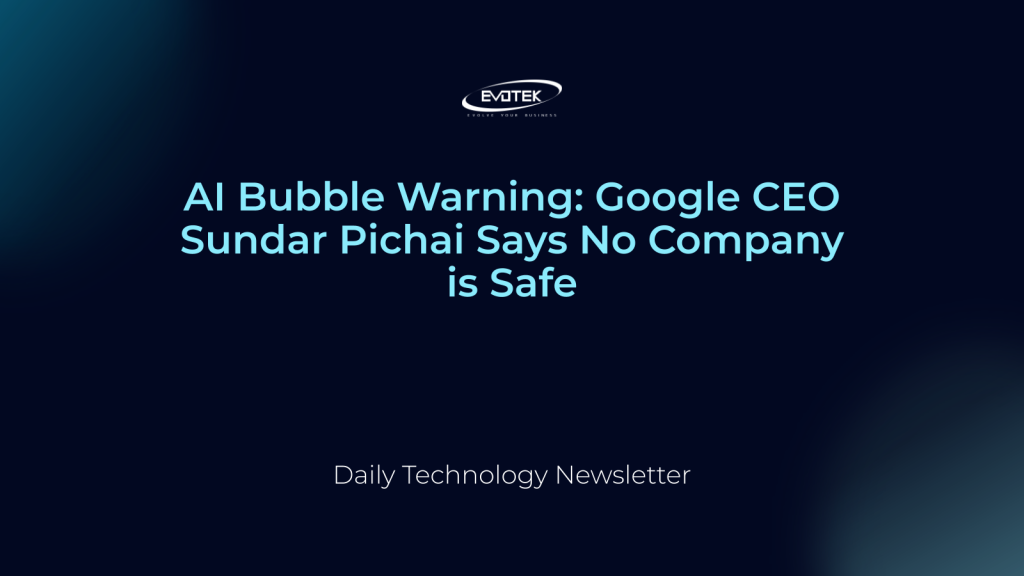Google CEO Sundar Pichai has issued a stark warning regarding the rapidly escalating artificial intelligence (AI) market, cautioning that an investment “bubble” could burst, leaving no tech giant unscathed. Speaking to the BBC, Pichai stated, “I think no company is going to be immune, including us,” as scrutiny intensifies over the sector’s soaring valuations.
The remarks come amidst an extraordinary period for Alphabet, Google’s parent company, which has seen its shares double in value over seven months, pushing its market capitalization to an astounding $3.5 trillion. During his exclusive interview at Google’s California headquarters, Pichai acknowledged the “extraordinary moment” of AI investment growth but cautioned against the industry’s tendency to “overshoot” during investment cycles.
Echoing the tremors of the late 1990s Internet boom and its subsequent dot-com bust in 2000, Pichai drew parallels, noting the eventual collapse of many early internet companies, leading to bankruptcies and significant job losses. “We can look back at the Internet right now. There was clearly a lot of excess investment, but none of us would question whether the Internet was profound,” Pichai reflected. “I expect AI to be the same. So I think it’s both rational and there are elements of irrationality through a moment like this.”
Skepticism Mounts as AI Investments Surge
Over the past year, skepticism has grown, particularly around Google competitor OpenAI. The company has reportedly committed to an astonishing $1.4 trillion in infrastructure spending over eight years, despite an estimated revenue of around $13 billion for the current year. OpenAI CEO Sam Altman himself admitted to reporters in August that investors are “overexcited” about AI models, foreseeing that “someone” will incur a “phenomenal amount of money” in losses.
Prominent AI industry critic Ed Zitron responded to Pichai’s comments, telling Ars Technica, “I think that this is the first moment where a magnificent 7 feels it’s necessary to be on the right side of history, leaning on the shaky talking point of ‘there was a lot of over investment in the Internet too’ because there really isn’t a defense for the—to use his own terminology—‘excess investment’ in AI.” Zitron anticipates other major players will follow suit with similar warnings.
Google’s Strategic Position Amidst Market Concerns
Alphabet’s impressive market performance has been fueled by investor confidence in its ability to rival OpenAI’s ChatGPT and its advancements in specialized AI chips, positioning it against market leader Nvidia. Nvidia recently achieved a world-first $5 trillion valuation, driven by its Graphics Processing Units (GPUs) essential for AI computations.
Despite acknowledging the universal vulnerability to an AI bubble burst, Pichai asserted Google’s unique advantage. He highlighted the company’s “full stack” of technologies, encompassing everything from advanced chips and extensive YouTube data to sophisticated AI models and cutting-edge frontier science research. This integrated approach, he believes, will better equip Google to navigate potential market turbulence compared to its competitors.
Navigating AI Accuracy, Energy Demands, and Societal Impact
Pichai also used the opportunity to caution against “blindly trust[ing]” everything AI tools produce. As Google grapples with repeated accuracy concerns about some of its own AI models, he advised users to “learn to use these tools for what they’re good at and not blindly trust everything they say,” particularly for creative tasks.
The Google boss additionally addressed the “immense” energy consumption of AI, admitting that the intensive power requirements of expanding AI ventures have impacted Alphabet’s climate targets. While committed to achieving net-zero by 2030 through investments in new energy technologies, Pichai warned, “The rate at which we were hoping to make progress will be impacted,” noting that constraining an economy based on energy “will have consequences.”
Even with his cautionary notes on a potential AI bubble, Pichai remained enthusiastic about the technology’s long-term potential. He described AI as “the most profound technology” humankind has ever developed, foreseeing significant “societal disruptions.” He predicts that AI will “create new opportunities” and “evolve and transition certain jobs,” emphasizing that those who adapt to AI tools “will do better” in their professions, irrespective of their field.

 日本語
日本語 한국어
한국어 Tiếng Việt
Tiếng Việt 简体中文
简体中文